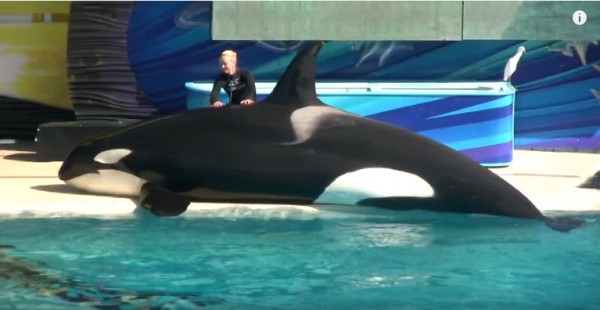By Prei Dy, | March 01, 2017

China starts breeding Orcas whales to accommodate the burgeoning middle class. (YouTube)
China wants to breed more killer whales to meet the increasing demand for zoos and theme parks. However, animal rights activists are not in support of this.
Chimelong Group, one of the largest amusement park operators in China, opened its first killer whale breeding center on Feb. 24 in the Chimelong Ocean Kingdom Park in Zhuhai, state-backed Xinhua reported. The breeding center has nine whales, including five males and four females, aged between five and 13 years.
Like Us on Facebook
The breeding center wants to "help cultivate the public's awareness of whale protection, develop related studies, and progress toward killer-whale breeding." The park did not divulge the size of the breeding facility and if the whales would do some tricks for the public.
Meanwhile, animal rights groups have criticized the breeding of whales, saying it could encourage "the surging aquarium industry in China."
China's move to breed whales comes even after several other theme parks with similar facilities, including Chile, India, and Switzerland, have been prohibited from keeping orcas in captive. Even the US' SeaWorld also committed to stop orca breeding practice last year and phased out killer whale performances. This is after it received some backlash from the release of the documentary "Blackfish," Quartz reported. Although SeaWorld has replaced the show with a program entitled "Orca Encounter," it has still been criticized for keeping the whales in captive.
Instead of aligning with conservationists' stance, China is doing quite the opposite, fueled by a burgeoning middle class thirsty for leisure entertainment. China is currently experiencing a boom in marine park construction, with 39 facilities in operation in 2016 and another 14 under construction.
Orcas in captivity usually have shorter lifespans than those in the wild, and critics have expressed concern for the killer whales' well-being in Chinese parks. Furthermore, the country does not have an animal welfare law to protect these creatures. An estimated 61 orcas are believed to currently be in captive across the world.
-
Use of Coronavirus Pandemic Drones Raises Privacy Concerns: Drones Spread Fear, Local Officials Say

-
Coronavirus Hampers The Delivery Of Lockheed Martin F-35 Stealth Fighters For 2020

-
Instagram Speeds Up Plans to Add Account Memorialization Feature Due to COVID-19 Deaths

-
NASA: Perseverance Plans to Bring 'Mars Rock' to Earth in 2031

-
600 Dead And 3,000 In The Hospital as Iranians Believed Drinking High-Concentrations of Alcohol Can Cure The Coronavirus

-
600 Dead And 3,000 In The Hospital as Iranians Believed Drinking High-Concentrations of Alcohol Can Cure The Coronavirus

-
COVID-19: Doctors, Nurses Use Virtual Reality to Learn New Skills in Treating Coronavirus Patients













